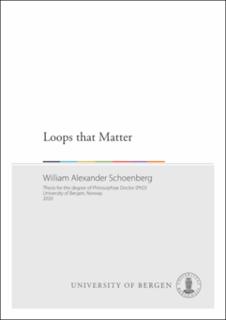Loops that Matter
Doctoral thesis

Åpne
Permanent lenke
https://hdl.handle.net/1956/24455Utgivelsesdato
2020-11-06Metadata
Vis full innførselSamlinger
- Department of Geography [634]
Sammendrag
Understanding the origins of behavior in time dependent, non-linear, dynamic mathematical systems with feedback is of critical importance for doing causally accurate science. The modern-day formal methods of loop dominance analysis used to understand the structural foundations of behavior within these systems struggles to find a foothold within the system dynamics community of practitioners. Within the machine learning field, discovering and measuring causality within in feedback systems is a challenge which does not yet have a solution. The modern-day methods within the machine learning field struggle with the discovery of causal structure in directed acyclic graphs.
This PhD presents two linked methods for solving these challenges. The first ‘Loops that Matter’ is a formal method of loop dominance analysis which is capable of discovering the strength and polarity of each feedback loop in any time dependent mathematical system. The second, ‘Feedback System Neural Network’, is an ordinary differential equation based machine learning method capable of discovering causal relationships in non-linear dynamic feedback rich systems directly from data using key mathematical constructs developed as a part of Loops that Matter.
In addition, this PhD discovers, develops and matures the technology to machine generate high quality animated simplified causal loop diagrams of model structure based upon the Loops the Matter method. All technology has been matured to the point of inclusion in the commercial software application Stella v2.0 which enjoys widespread use throughout the scientific and educational communities related to system dynamics.
This PhD will walk the reader through the theories underlying the design of the methods, the implementation of all the aforementioned methods and the necessary challenges which were solved in order to make the methods widely applicable and usable by those within the scientific and educational communities.
Består av
Paper I: Schoenberg, W., Davidsen, P., & Eberlein, R. (2020). Understanding model behavior using the loops that matter method. System Dynamics Review. 36(2):158-190. The article is available in the main thesis. The article is also available at: https://doi.org/10.1002/sdr.1658Paper II: Schoenberg, W. (2019). LoopX: Visualizing and understanding the origins of dynamic model behavior. arXiv preprint arXiv:1909.01138. The article is available in the main thesis.
Paper III: Schoenberg, W. (2019). Feedback System Neural Networks for Inferring Causality in Directed Cyclic Graphs. arXiv preprint arXiv: 1908.10336. The article is available in the main thesis.
Paper IV: Eberlein, R. & Schoenberg, W. (2020). Finding the Loops that Matter. arXiv preprint arXiv:2006.08425. The article is available in the main thesis.
Paper V: Schoenberg, W., & Eberlein, R. (2020). Seamlessly Integrating Loops That Matter into Model Development and Analysis. arXiv preprint arXiv:2005.14545. The article is available in the main thesis.